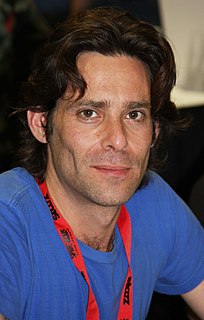A Quote by Joshua Ferris
The thing is, for me, as a fiction writer, I don't think there's a finer testament to our lives than this thing that's being spurned - the emotional intelligence, the ethics, the beauty. It's all there. It's all so fully contained in a novel that succeeds. But at the same time, I understand the impulse to put away childish things.
Related Quotes
Being in a hurry. Getting to the next thing without fully entering the thing in front of me. I cannot think of a single advantage I've ever gained from being in a hurry. But a thousand broken and missed things, tens of thousands, lie in the wake of all the rushing.... Through all that haste I thought I was making up time. It turns out I was throwing it away.
My cure for writer's block is to step away from the thing I'm stuck on, usually a novel, and write something totally different. Besides fiction, I write poetry, screenplays, essays and journalism. It's usually not the writing itself that I'm stuck on, but thing I'm trying to write. So I often have four or five things going at once.
It seems to me that one of the things that happened with a lot of literary fiction in the 1980s and 1990s was that it became very concerned with the academy and less with how people live their lives. We got to a point where the crime novel stepped into the breach. It was also a time when the crime novel stopped being so metropolitan.
The movement for women's liberation was about an emotional transformation, an explosion, a feeling all over the country that things must be different, and ideas about how they should be. I think fiction can capture that kind of thing better than other genres because in fiction you can explore the feelings of your characters - the before and the after.
Human beings are very unbalanced and prone to go off on tangents. In every area of life- with too great emphasis on one thing, leaving out another important thing altogether. None of us will ever be perfectly balanced in our spiritual lives, our intellectual lives, our emotional lives, our family lives, in relationships with other human beings, or in our business lives. BUT WE ARE CHALLENGED TO TRY, WITH THE HELP OF GOD. We are meant to live in the scriptures.
I did worry about being in a science-fiction show. The bits that I was reading, I felt were funny, and I felt the man was childish, so I really did ask initially, "Is this for kids?" And the thing that came back immediately was like, "Hey, take a look at this whole thing again. This is definitely not for children. How can you think that?"
The key to teaching anything is to remember what it was like not to understand that thing. That's a very hard thing to do. Every time you come to understand something you didn't understand before, you are transformed. You become a different person from who you were before. The key to teaching someone else to understand that same thing is to remember your former, untransformed self. If you can do that, I think you can teach anything, even physics.
I think our mental picture of God is the most important fact about our life. All other things being equal, the beauty of our life won't outrun the beauty of our vision of God. Unfortunately, the God that many Christians envision is not completely Christ-like, but is rather influenced by the violent depictions of God in the Old Testament.
There's the fact that American fiction is basically the most apolitical fiction on the globe. A South American writer wouldn't dare think of writing a novel if it didn't allude to the system into which these people are orchestrated - or an Eastern European writer, or a Russian writer, or a Chinese writer. Only American writers are able to imagine that the government and the corporations - all of it - seem to have no effect whatsoever.



































